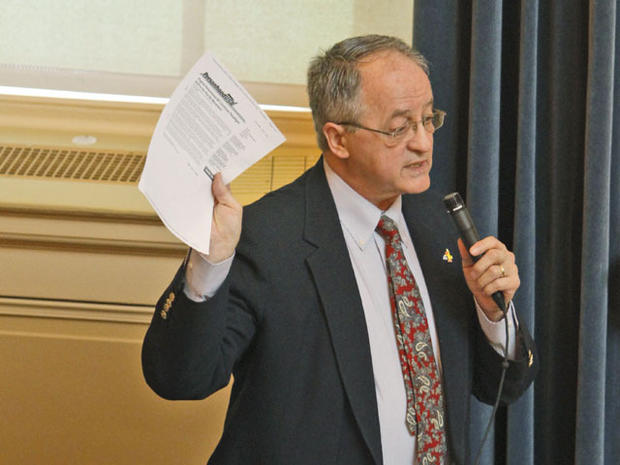Anti-abortion bills spark heated debate in Virginia
The Tuesday passage in Virginia of two of the strictest anti-abortion bills in the country has sparked fierce debate over abortion rights the battleground state, with Democrats decrying the acts as an unprecedented encroachment on women's rights as Republicans push to move the legislation forward.
One bill, Republican Del. Bob Marshall's House bill 1, would define personhood at conception and "provides that unborn children at every stage of development enjoy all the rights, privileges, and immunities available to other persons, citizens, and residents of the Commonwealth." The second bill requires that women be required to undergo an ultrasound procedure prior to having an abortion.
The personhood bill, which passed by 66-32 in the Virginia state House, does not ban abortions, the legality of which are protected under the Supreme Court decision Roe v. Wade. It would, however, make illegal certain types of contraceptive measures, including emergency contraception. Women's health advocates say it could also open the door to banning birth control pills and intrauterine devices (IUD).
Opponents of the personhood bill decry the legislation for curbing women's rights to contraception, and argue that the bill is meant to serve as a "trigger ban," which would make abortion illegal immediately in the event that Roe V. Wade is overturned.
"The General Assembly is dangerously close to making Virginia the first state in the country to grant personhood rights to fertilized eggs," said Tarina Keene, executive director of NARAL Pro-Choice Virginia, in a statement.
Democratic Virginia Delegate Charnielle Herring, an outspoken opponent of the two bills, called the bill "an attack on women's health."
In an interview with Hotsheet, Keene argued that, beyond the potential ideological questions associated with granting a fertilized egg the same rights as people, passing the bill would yield immediate practical consequences that "we can't even fathom at this point."
Keene noted that there are more than 25,000 references to the word "person" in the Virginia legislative code, and that applying all of the laws pertaining to "persons" to all existing fertilized eggs would inevitably become complicated.
She pointed to an example in which a couple undergoing in vitro fertilization successfully becomes pregnant without using as many eggs as were fertilized in the procedure. Those additional eggs would thus be considered "persons," and the couple could use exploit those "persons" to get additional tax breaks, she argued.
Herring also argues that the personhood bill is being used as a tool by Republicans to "lay the groundwork" for overturning Roe v. Wade.
"The government has no place mandating procedures," she told Hotsheet. "We're legislators, we're not physicians."
One issue that has come under the microscope with relation to the ultrasound bill is its requirement that some women undergo a transvaginal ultrasound probe, which is considered more physically invasive than other procedures.
While the bill does not explicitly mandate the use of transvaginal ultrasounds, many women would inevitably be required to undergo them; in the early stages of pregnancy, that procedure is often the only form of ultrasound that can detect a fetus' heartbeat.
Republicans argue that the ultrasound bill will protect women from complications during abortion procedures, and that providing a woman with the gestational age of the fetus is crucial to her "informed consent" to have an abortion.
"This may be the most important decision that she ever makes in her life. A tough decision. And we determined over a decade ago that we were going to ensure that a woman has a right to have all the information avail to her before making that decision," said Republican Delegate Kathy Byron, the sponsor of the ultrasound bill, in debate on the House floor.
The conservative Family Foundation also heralded the requirement as a necessary update to the Commonwealth's informed consent law, providing "modern technology, ensuring that a woman facing an unplanned pregnancy and considering abortion has as much information as possible available to her."
Keene, conversely, argues the requirement is a way to "shame women and try to convince them to change their minds and not have a procedure they've probably already thought long and hard about."
The two bills have already become a hot-button issue for some political candidates in the state, and could gain prominence on the national stage if they are signed into law.
Former Democratic Virginia Governor Tim Kaine, who is running against Republicans George Allen and Marshall for the state's open Senate seat in 2012, decried the personhood bill as "reckless," and challenged Allen to publicly embrace it.
According to the Richmond Times-Dispatch, Allen on Wednesday affirmed his support for the bill.
"This measure is about protecting innocent unborn life. If a criminal hits a pregnant mother injuring or killing the unborn child, then there would be a cause of action for that child as well," said Allen spokeswoman Katie Wright.
"Democrats are desperately trying to make this a battle over contraceptives. As George Allen has often said he is opposed to the government prohibiting or banning contraceptives - and this bill doesn't do that," she added.
The Virginia state Senate has already passed an ultrasound bill, and Republican Governor Bob McDonnell is expected to sign the legislation when it lands on his desk. He does not have a formal position on the personhood bill.
The Virginia state Senate is evenly divided between Republicans and Democrats; Lt. Gov. Bill Bolling, a Republican, would be the tie-breaking vote on the personhood bill if members voted along party lines.
When asked Tuesday whether or not he knew how he would vote on the issue, Bolling said he did not, according to the Times-Dispatch.
Delegate Herring said that if the governor were to sign the personhood bill, it would show "just how far [Virginia Republicans] are willing to go to infringe on a woman's right to choose."
